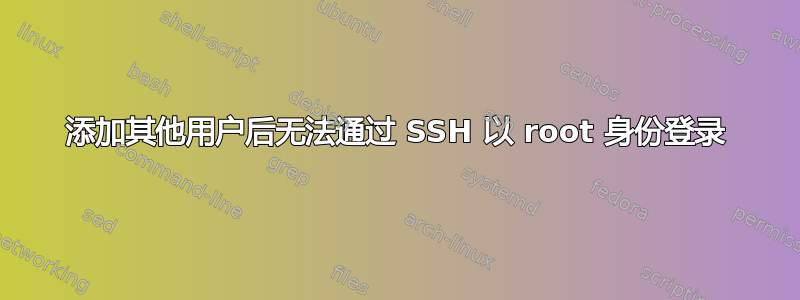
通过 SSH 登录很长时间都没问题,直到我添加了另一个用户并启用密码授权(仅限公钥)。现在我无法以 root 身份登录,无论是使用密码还是公钥。但我 100% 确信我的凭据是安全的,因为我能够su从新添加的用户会话中切换到 root 和密码。
你知道如何恢复 root 登录吗?谢谢
服务器操作系统版本 Ubuntu 18.04.1 LTS
/etc/ssh/sshd_config
# $OpenBSD: sshd_config,v 1.101 2017/03/14 07:19:07 djm Exp $
# This is the sshd server system-wide configuration file. See
# sshd_config(5) for more information.
# This sshd was compiled with PATH=/usr/bin:/bin:/usr/sbin:/sbin
# The strategy used for options in the default sshd_config shipped with
# OpenSSH is to specify options with their default value where
# possible, but leave them commented. Uncommented options override the
# default value.
#Port 22
#AddressFamily any
#ListenAddress 0.0.0.0
#ListenAddress ::
#HostKey /etc/ssh/ssh_host_rsa_key
#HostKey /etc/ssh/ssh_host_ecdsa_key
#HostKey /etc/ssh/ssh_host_ed25519_key
# Ciphers and keying
#RekeyLimit default none
# Logging
#SyslogFacility AUTH
#LogLevel INFO
# Authentication:
#LoginGraceTime 2m
#PermitRootLogin prohibit-password
PermitRootLogin no
#StrictModes yes
MaxAuthTries 3
#MaxSessions 10
#PubkeyAuthentication yes
# Expect .ssh/authorized_keys2 to be disregarded by default in future.
#AuthorizedKeysFile .ssh/authorized_keys .ssh/authorized_keys2
#AuthorizedPrincipalsFile none
#AuthorizedKeysCommand none
#AuthorizedKeysCommandUser nobody
# For this to work you will also need host keys in /etc/ssh/ssh_known_hosts
#HostbasedAuthentication no
# Change to yes if you don't trust ~/.ssh/known_hosts for
# HostbasedAuthentication
#IgnoreUserKnownHosts no
# Don't read the user's ~/.rhosts and ~/.shosts files
#IgnoreRhosts yes
# To disable tunneled clear text passwords, change to no here!
PasswordAuthentication yes
#PermitEmptyPasswords no
# Change to yes to enable challenge-response passwords (beware issues with
# some PAM modules and threads)
ChallengeResponseAuthentication no
# Kerberos options
#KerberosAuthentication no
#KerberosOrLocalPasswd yes
#KerberosTicketCleanup yes
#KerberosGetAFSToken no
# GSSAPI options
#GSSAPIAuthentication no
#GSSAPICleanupCredentials yes
#GSSAPIStrictAcceptorCheck yes
#GSSAPIKeyExchange no
# Set this to 'yes' to enable PAM authentication, account processing,
# and session processing. If this is enabled, PAM authentication will
# be allowed through the ChallengeResponseAuthentication and
# PasswordAuthentication. Depending on your PAM configuration,
# PAM authentication via ChallengeResponseAuthentication may bypass
# the setting of "PermitRootLogin without-password".
# If you just want the PAM account and session checks to run without
# PAM authentication, then enable this but set PasswordAuthentication
# and ChallengeResponseAuthentication to 'no'.
UsePAM yes
#AllowAgentForwarding yes
#AllowTcpForwarding yes
#GatewayPorts no
X11Forwarding yes
#X11DisplayOffset 10
#X11UseLocalhost yes
#PermitTTY yes
PrintMotd no
#PrintLastLog yes
#TCPKeepAlive yes
#UseLogin no
#PermitUserEnvironment no
#Compression delayed
#ClientAliveInterval 0
#ClientAliveCountMax 3
#UseDNS no
#PidFile /var/run/sshd.pid
#MaxStartups 10:30:100
#PermitTunnel no
#ChrootDirectory none
#VersionAddendum none
# no default banner path
#Banner none
# Allow client to pass locale environment variables
AcceptEnv LANG LC_*
# override default of no subsystems
Subsystem sftp /usr/lib/openssh/sftp-server
# Example of overriding settings on a per-user basis
#Match User anoncvs
# X11Forwarding no
# AllowTcpForwarding no
# PermitTTY no
# ForceCommand cvs server
GatewayPorts=clientspecified
#PasswordAuthentication no
#Match address 10.1.0.0/24
PasswordAuthentication yes
ssh -vvv
debug1: Authentications that can continue: publickey,password
debug3: start over, passed a different list publickey,password
debug3: preferred gssapi-with-mic,publickey,keyboard-interactive,password
debug3: authmethod_lookup publickey
debug3: remaining preferred: keyboard-interactive,password
debug3: authmethod_is_enabled publickey
debug1: Next authentication method: publickey
debug1: Offering public key: /home/dimka/.ssh/id_rsa RSA SHA256:x1v7USU6qhcSxkVnnYVab+8r8oC0vNPewT4glgxJ6Nc agent
debug3: send packet: type 50
debug2: we sent a publickey packet, wait for reply
debug3: receive packet: type 60
debug1: Server accepts key: /home/dimka/.ssh/id_rsa RSA SHA256:x1v7USU6qhcSxkVnnYVab+8r8oC0vNPewT4glgxJ6Nc agent
debug3: sign_and_send_pubkey: RSA SHA256:x1v7USU6qhcSxkVnnYVab+8r8oC0vNPewT4glgxJ6Nc
debug3: sign_and_send_pubkey: signing using rsa-sha2-512 SHA256:x1v7USU6qhcSxkVnnYVab+8r8oC0vNPewT4glgxJ6Nc
debug3: send packet: type 50
debug3: receive packet: type 51
debug1: Authentications that can continue: publickey,password
debug1: Trying private key: /home/dimka/.ssh/id_dsa
debug3: no such identity: /home/dimka/.ssh/id_dsa: No such file or directory
debug1: Trying private key: /home/dimka/.ssh/id_ecdsa
debug3: no such identity: /home/dimka/.ssh/id_ecdsa: No such file or directory
debug1: Trying private key: /home/dimka/.ssh/id_ecdsa_sk
debug3: no such identity: /home/dimka/.ssh/id_ecdsa_sk: No such file or directory
debug1: Trying private key: /home/dimka/.ssh/id_ed25519
debug3: no such identity: /home/dimka/.ssh/id_ed25519: No such file or directory
debug1: Trying private key: /home/dimka/.ssh/id_ed25519_sk
debug3: no such identity: /home/dimka/.ssh/id_ed25519_sk: No such file or directory
debug1: Trying private key: /home/dimka/.ssh/id_xmss
debug3: no such identity: /home/dimka/.ssh/id_xmss: No such file or directory
debug2: we did not send a packet, disable method
debug3: authmethod_lookup password
debug3: remaining preferred: ,password
debug3: authmethod_is_enabled password
debug1: Next authentication method: password


